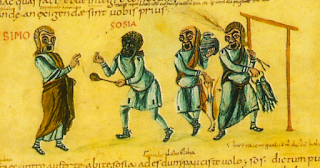Which is completely in tune with Plautus, by the way.
Plautus wrote about 130 plays but we have only twenty of them surviving today. He was the first professional playwright, the first to make his living from writing plays; and like Shakespeare, Molière, and many others after him, his plays were intentionally commercial, meant for the masses, for all social classes.
And he was very successful commercially. Most of his plays included songs, and in many ways, Plautus was writing an early prototypal form of American musical comedy. We can tell he was learning how to use songs in these plays as he wrote them -- the later the play, the more songs it contains.
Translator and writer Erich Segal says, “Not since Aristophanes had an audience heard such vivacious verbal abandon. What a language Plautus’ characters speak! Unlike the simple, forthright (good old Roman) style championed by his conservative contemporary Cato, the dialogue is purple, but not blue; it is racy, but not dirty. Plautus is repetitive, mock-elegant, mock-heroic, mock-everything. He invents all sorts of delicious new words.” Just like Shakespeare.
Scholar Eric Handley says, “Plautus likes his colors strong, his staging more obvious, his comedy more comic.” Scholar George Duckworth says, “Plautus never uses one phrase if three or six will be more effective.” Plautus also loved playing with meta jokes, a theatrical self-consciousness, in which the actors would refer to themselves as actors and the play as a play. In his play Poenulus, one of the actors says to another, “Be brief, the audience is thirsty!”
The Greeks invented comedy, first as the crazy, naughty, supernatural comedies of Aristophanes and his peers; then later it evolved into something edging closer to what we now think of as old-school musical comedy. Plautus often used Greek comedies as source material, but he loaded on the sight gags, puns, double-entendres, mistaken identities, malapropisms, etc. He translated Greek oration into Latin song. His plays were frequently about sacred “Roman values” being subverted, violated, overthrown.
All of this also describes A Funny Thing Happened on the Way to the Forum.
Roman comedies, like those of Plautus, were always set in front of one, two, or three houses; Forum plays out in front of three. Any of these three doors onstage could portray the home of a citizen, a courtesan, or a temple.
Theatre performances were held in various locations around Athens, including the Palatine, the most important of the Seven Hills of Rome, in the forum, or as part of the funeral rites for an aristocrat.
While the early Greek dramas had only three actors on stage, by the time Plautus was writing Roman comedies, they were using casts of ten or more, and scenes involving four or five characters at once, in addition to others onstage.
He used several stock character types, many of them subversive and chaos-causing, and we see them all in A Funny Thing Happened on the Way to the Forum: the greedy pimp (Marcus Lycus), bitchy wives (Domina), silly old codgers (Erronius), senile Romeos (Senex), and the clever slave and “agent of chaos” (Pseudolus). So many of Plautus’ plays inspired later works. Miles Gloriosus foreshadows Shakespeare’s Falstaff. Plautus’ comedy The Brothers Menaechman is an obvious source for Shakespeare’s The Comedy of Errors as well as the musicals The Boys from Syracuse and The Bomb-itty of Errors. Plautus’ play The Pot of Gold is a source for Molière’s comedy The Miser.
Sondheim said, “Plautus was the first person to domesticize comedy. All comedy, Aristophanes, for instance, was about gods and goddesses. Nobody had ever written about husbands and wives, daughters and maids. Plautus is responsible for the situation comedy.”
It's so much fun working (indirectly) on Plautus and on Sondheim at the same time. The more we run the show, the more everything falls into place, the funnier and funnier it gets.
And of course, Sondheim and his collaborators can't help but throw in some subtle but sharp satire underneath the wild plot.
I've had a blast living in this silly but smart world, and I can't wait to share it with our audiences. As is often the case, I think the fierce up-close-ness of our theatre will make everything feel even crazier and wilder.
The adventure continues. Next week is Hell Week!
Long Live the Musical!
Scott
To buy your tickets for A Funny Thing Happened on the Way to the Forum, click here.
To buy your New Line season tickets for next season, click here.
To donate to New Line Theatre, click here.
To check out my newest musical theatre books, including my latest, He Never Did Anything Twice: Deconstructing Stephen Sondheim, click here.










0 comments:
Post a Comment